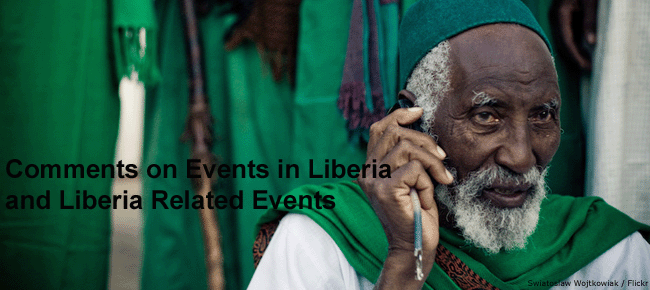Monday, December 1
Matilda Newport (1822) and the civil war
Today, December 1, I had to think of Matilda Newport, a Liberian heroine. Generations of Liberians of all walks of life and every possible background have grown up with ‘Matilda Newport’. For over a century, December 1 was celebrated as a national holiday throughout the country. Liberian school children paraded in the streets of Monrovia and other cities, honoring this courageous woman. Matilda Newport, as the story goes, was a settler-woman, who in 1822 helped to repel an attack on the first struggling settlement by local tribesmen, known as the battle of Crown Hill. Reportedly, she fired a cannon using a coal from her pipe and killed virtually all native people, chasing the survivors. She thus saved the colony.
Nowadays, the younger generation may hardly know who she was. Matilda Newport Day, as December 1 was known, was abolished some 30 years ago. It is typical for Liberia’s unfinished written history that sources differ as to who abolished this controversial holiday. According to some sources the leaders of the 1980 coup, Samuel Doe and his comrades, abolished the holiday which they hated because it symbolized the political and social divide of Africa’s first republic. Other sources state that the Matilda Newport holiday was discontinued by President William R. Tolbert, in his desire to demonstrate that he sought to further cement the unification of the country.
Who was Matilda Newport? Did she really exist or was she an invention of the Americo-Liberian ruling elite, to portray their superiority and to re-affirm the inferiority and cowardice of the aborigines who lived on the land they claimed?
Many Liberian historians and authors of history books have devoted many pages to Matilda Newport, such as Ernest J. Yancy, Richard A. Henries and A. Doris Banks Henries, C. Abayomi Cassell and Nathaniel R. Richardson. The accounts of the Matilda Newport story vary from author to author but have in common that most references to the ‘natives’ were negative: 'savage, primitive, belligerent people' (A. Doris Banks Henries).
Foreign scholars have also researched the Matilda Newport story, like Jane J. Martin and Rodney Carlisle, who conducted a study ‘The Search for Matilda Newport’, published in the Liberian Studies Journal in 1975. Also Svend Holsoe threw more light on Liberia’s heroine in a paper presented at the Liberian Studies Conference, Indiana University, in 2007, ‘Matilda Newport: The Power of a Liberian Invented Tradition’. Particularly I would like to recommend, however, the excellent writings of Siahyonkron Nyanseor. He conducted extensive research on Matilda Newport alleged deeds. His (unpublished) research paper is entitled: ‘Matilda Newport’s Deed, Myth or Reality’. In 2004 he published the essay ‘Putting to Rest the Matilda Newport Myth’ (see Part I and Part II). The following quotation is from this source:
“Based on available sources, Matilda Newport was a real person who resided in Liberia during this period. She came to Africa on the “Elizabeth,” March 9, 1820 at the age of 25 as Matilda Spencer, the spouse of the 32 years old, Thomas Spencer. According to records, she could not read nor write (illiterate). During the Battles of Fort Hill, Matilda Spencer was 27 years old. Had she performed the deed she is credited with, she would have been known as Matilda Spencer, and not Matilda Newport. Probably, her husband, Thomas Spencer was killed in one of the conflicts. According to the Emigrant List, he died as a casualty in 1822. Matilda Spencer married to Ralph Newport sometime after 1822. Her story borne of the need to pass on the so-called victory of the Settlers over the natives, and it was nurtured through myth of larger-than-life proportions (....)”.
Matilda Newport and the civil war
On September 3, 2008 a Liberian historian, Professor Augustine Konneh, testified before the Truth and Reconciliation Committee (TRC) that the system of authoritarianism, established by the American Colonization Society (ASC) and sustained and expanded by the various Liberian governments, from Joseph J. Roberts to Samuel K. Doe, laid the foundation of the civil war.
He said Liberians must also recognize and reconsider some of the nation’s myths, saying that myths exist in every society and Liberia is no exception. One of these myths, he said, is the Matilda Newport story, which he contended is an account of heroism on the part of Americo-Liberians and cowardice on the part of native Liberians. He said this false sense of heroism and cowardice have been the main source of conflict amongst generations of Liberians on either side of the political and social divide and thus undermine true patriotism and nationalism in Liberia.
I have a feeling (large) parts of Liberia’s history may have to be re-written.
2008/12/01
Subscribe to:
Post Comments (Atom)


1 comment:
Thank you for this post. I'm still trying to learn more about Matilda Newport and her role (or not) in stitching the first Liberian Flag.
Appreciate your comprehensive round up!
Best, Kyra
www.BlackThreads.blogspot.com
Post a Comment